| Listing 1 - 10 of 11 | << page >> |
Sort by
|
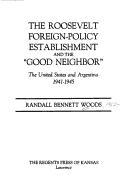
ISBN: 0700601880 0700631348 Year: 1979 Publisher: Lawrence Regents Press of Kansas
Abstract | Keywords | Export | Availability | Bookmark
 Loading...
Loading...Choose an application
- Reference Manager
- EndNote
- RefWorks (Direct export to RefWorks)
Roosevelt, Franklin Delano --- Duggan, Laurence --- Wilson, Woodrow Thomas, 1856-1924 --- United States --- Foreign relations --- Argentina --- 1933-1945
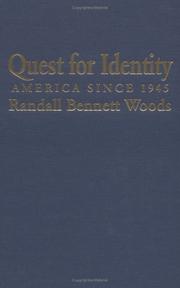
ISBN: 0521840651 9780521840651 9780511814020 9780521549974 0511111495 9780511111495 051181402X 1280422270 9781280422270 0511111169 9780511111167 9786610422272 6610422273 0521549973 1107140080 9781107140080 0511181256 9780511181252 0511197853 9780511197857 0511298994 9780511298998 Year: 2005 Publisher: Cambridge Cambridge University Press
Abstract | Keywords | Export | Availability | Bookmark
 Loading...
Loading...Choose an application
- Reference Manager
- EndNote
- RefWorks (Direct export to RefWorks)
Quest for Identity, published in 2005, is a survey of the American experience from the close of World War II, through the Cold War and 9/11, to the present. It helps students understand postwar American history through a seamless narrative punctuated with accessible analyses. Randall Woods addresses and explains the major themes that punctuate the period: the Cold War, the Civil Rights and Women's Rights movements, and other great changes that led to major realignments of American life. While political history is emphasized, Woods also discusses in equal measure cultural matters and socio-economic problems. Dramatic new patterns of immigration and migration characterized the period as much as the counterculture, the growth of television and the Internet, the interstate highway system, rock and roll, and the exploration of space. The pageantry, drama, irony, poignancy and humor of the American journey since World War II are all here.
National characteristics, American --- 973.092 --- American national characteristics --- 973.092 Geschiedenis van de Verenigde Staten van Amerika: late 20ste eeuw--(1953- ) --- Geschiedenis van de Verenigde Staten van Amerika: late 20ste eeuw--(1953- ) --- United States --- History --- Social conditions --- History of North America --- anno 1940-1949 --- anno 1950-1959 --- anno 1960-1969 --- anno 1970-1979 --- anno 1980-1989 --- anno 1990-1999 --- National characteristics, American. --- 1945 --- -United States --- -National characteristics [American ] --- Arts and Humanities --- National characteristics [American ]
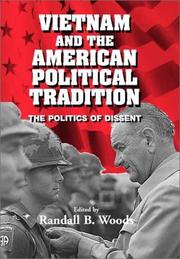
ISBN: 1107132665 1280161116 1139147900 0511120273 0511064489 0511058152 0511307020 051161537X 0511072945 9780511064487 9780511058158 9780511120275 9780521010009 0521010004 9780521811484 0521811481 9786610161119 6610161119 9781107132665 9781280161117 9781139147903 9780511307027 9780511072949 9780511615375 Year: 2003 Publisher: Cambridge, UK New York Cambridge University Press
Abstract | Keywords | Export | Availability | Bookmark
 Loading...
Loading...Choose an application
- Reference Manager
- EndNote
- RefWorks (Direct export to RefWorks)
This volume is intended to demonstrate how opposition to the war in Vietnam, the military-industrial complex, and the national security state crystallized in a variety of different and often divergent political traditions. Indeed, for many of the figures discussed, dissent was a decidedly conservative act in that they felt that the war threatened traditional values, mores, and institutions, even though their definitions of what was sacred differed profoundly. To an extent many of the dissenters treated in this volume were at one time Cold War liberals. During the course of the Vietnam War, they came to see the foreign policy which they were supporting, with its willingness to invoke the democratic ideal and at the same time tolerate dictatorships in the cause of anticommunism, as morally and politically corrupt. Most dissenters increasingly came to perceive cold war liberalism as a radical departure that threatened the fundamental ideals of the republic.
Vietnam War, 1961-1975 --- Protest movements --- United States --- Politics and government --- Arts and Humanities --- History
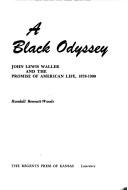
ISBN: 070063133X 0700602070 Year: 1981 Publisher: University Press of Kansas
Abstract | Keywords | Export | Availability | Bookmark
 Loading...
Loading...Choose an application
- Reference Manager
- EndNote
- RefWorks (Direct export to RefWorks)
This book focuses on the career of a single individual—an ambitious, resourceful Black American—and his efforts to realize personal fulfillment in a racist world.No Black American was more determined to realize the promise of American life following the Civil War, nor more frustrated by his inability to do so than John Lewis Waller. Waller, whose first twelve years were spent in slavery, overcame his humble beginnings to become a politician, lawyer, journalist, and diplomat. Nevertheless, his life provides a case study of a middle class black caught between a desire to work within the existing political and economic framework and a need to reject a milieu that was becoming increasingly racist.Waller spent his childhood as a slave in Missouri, and his adolescence on a farm in Iowa. Circumstances and personal ambition combined to allow Waller to acquire a trade—barbering—and a profession—lawyering—in the 1870s. In 1878 he migrated to frontier Kansas, where he practiced law, edited a newspaper, rose to a position of leadership in the black community, and became an important figure in the state Republican party. His political career ended abruptly in 1890, however, when the Republicans rejected his bid to be nominated as the party’s candidate for state auditor. Convinced that his defeat was due to the rising tide of racism throughout the nation, he turned his attentions abroad.Waller was particularly susceptible to the lure of overseas empire because he had spent much of his adult life in the midst of a community of people who had succumbed to the myth of a “promised land,” who were convinced that the Black person would be best able to realize his potential in economically underdeveloped regions not yet exploited and controlled by the white man. In 1891 President Benjamin Harrison appointed Waller United States consul to the east African island of Madagascar. By 1894 Waller had obtained a huge land grant there for the founding of a black utopia. He hoped to establish a plantationcolony that would simultaneously advance his personal fortunes, serve as an investment opportunity for aspiring black capitalists, and constitute a refuge for oppressed AfroAmericans who wished to immigrate. He was thwarted once again by racism, however—this time in the guise of French imperialism. Viewing Waller and his plans as a threat to their hegemony in Madagascar, French authorities quashed the concession, arrested Waller on a charge of being a spy, and sentenced him to twenty years in prison. There followed a fullscale diplomatic confrontation between the United States and France. Waller was released after serving ten months in a French prison, but only after the Cleveland administration agreed to discredit him to the point where he would seem guilty as charged.In his early manhood John Lewis Waller had realized that because he was a Negro personal achievement could not be separated from racial advancement. Responding to that perception, he spent a lifetime searching for a frontier where blacks could enjoy the blessings of democracy and capitalism, and yet be free of the blight of racism. Unlike the vast majority of American Blacks of his time, Waller was able to articulate his dreams, have an impact on the larger, white dominated environment, and realize his individual potential to a remarkable degree. Nevertheless, his dreams were ultimately dashed by racism. His sad but fascinating story deserves the careful attention of all students of politics and race relations during the complex postCivil War year.
Race relations. --- Politicians. --- Diplomats. --- African Americans --- African Americans. --- Diplomats --- Politicians --- Social conditions. --- Social conditions --- History. --- United States. --- Kansas. --- United States --- Statesmen --- Afro-Americans --- Black Americans --- Colored people (United States) --- Negroes --- Africans --- Ethnology --- Blacks --- Integration, Racial --- Race problems --- Race question --- Relations, Race --- Social problems --- Sociology --- Ethnic relations --- Minorities --- Racism --- US-KS --- KS --- KA --- Kans. --- Kan. --- Kansas Territory --- ABŞ --- ABSh --- Ameerika Ühendriigid --- America (Republic) --- Amerika Birlăshmish Shtatlary --- Amerika Birlăşmi Ştatları --- Amerika Birlăşmiş Ştatları --- Amerika ka Kelenyalen Jamanaw --- Amerika Qūrama Shtattary --- Amerika Qŭshma Shtatlari --- Amerika Qushma Shtattary --- Amerika (Republic) --- Amerikai Egyesült Államok --- Amerikanʹ Veĭtʹsėndi︠a︡vks Shtattnė --- Amerikări Pĕrleshu̇llĕ Shtatsem --- Amerikas Forenede Stater --- Amerikayi Miatsʻyal Nahangner --- Ameriketako Estatu Batuak --- Amirika Carékat --- AQSh --- Ar. ha-B. --- Arhab --- Artsot ha-Berit --- Artzois Ha'bris --- Bí-kok --- Ē.P.A. --- EE.UU. --- Egyesült Államok --- ĒPA --- Estados Unidos --- Estados Unidos da América do Norte --- Estados Unidos de América --- Estaos Xuníos --- Estaos Xuníos d'América --- Estatos Unitos --- Estatos Unitos d'America --- Estats Units d'Amèrica --- Ètats-Unis d'Amèrica --- États-Unis d'Amérique --- Fareyniḳṭe Shṭaṭn --- Feriene Steaten --- Feriene Steaten fan Amearika --- Forente stater --- FS --- Hēnomenai Politeiai Amerikēs --- Hēnōmenes Politeies tēs Amerikēs --- Hiwsisayin Amerikayi Miatsʻeal Tērutʻiwnkʻ --- Istadus Unidus --- Jungtinės Amerikos valstybės --- Mei guo --- Mei-kuo --- Meiguo --- Mî-koet --- Miatsʻyal Nahangner --- Miguk --- Na Stàitean Aonaichte --- NSA --- S.U.A. --- SAD --- Saharat ʻAmērikā --- SASht --- Severo-Amerikanskie Shtaty --- Severo-Amerikanskie Soedinennye Shtaty --- Si︠e︡vero-Amerikanskīe Soedinennye Shtaty --- Sjedinjene Američke Države --- Soedinennye Shtaty Ameriki --- Soedinennye Shtaty Severnoĭ Ameriki --- Soedinennye Shtaty Si︠e︡vernoĭ Ameriki --- Spojené obce severoamerické --- Spojené staty americké --- SShA --- Stadoù-Unanet Amerika --- Stáit Aontaithe Mheiriceá --- Stany Zjednoczone --- Stati Uniti --- Stati Uniti d'America --- Stâts Unîts --- Stâts Unîts di Americhe --- Steatyn Unnaneysit --- Steatyn Unnaneysit America --- SUA (Stati Uniti d'America) --- Sŭedineni amerikanski shtati --- Sŭedinenite shtati --- Tetã peteĩ reko Amérikagua --- U.S. --- U.S.A. --- United States of America --- Unol Daleithiau --- Unol Daleithiau America --- Unuiĝintaj Ŝtatoj de Ameriko --- US --- USA --- Usono --- Vaeinigte Staatn --- Vaeinigte Staatn vo Amerika --- Vereinigte Staaten --- Vereinigte Staaten von Amerika --- Verenigde State van Amerika --- Verenigde Staten --- VS --- VSA --- Wááshindoon Bikéyah Ałhidadiidzooígíí --- Wilāyāt al-Muttaḥidah --- Wilāyāt al-Muttaḥidah al-Amirīkīyah --- Wilāyāt al-Muttaḥidah al-Amrīkīyah --- Yhdysvallat --- Yunaeted Stet --- Yunaeted Stet blong Amerika --- ZDA --- Združene države Amerike --- Zʹi︠e︡dnani Derz︠h︡avy Ameryky --- Zjadnośone staty Ameriki --- Zluchanyi︠a︡ Shtaty Ameryki --- Zlucheni Derz︠h︡avy --- ZSA --- Η.Π.Α. --- Ηνωμένες Πολιτείες της Αμερικής --- Америка (Republic) --- Американь Вейтьсэндявкс Штаттнэ --- Америкӑри Пӗрлешӳллӗ Штатсем --- САЩ --- Съединените щати --- Злучаныя Штаты Амерыкі --- ولايات المتحدة --- ولايات المتّحدة الأمريكيّة --- ولايات المتحدة الامريكية --- 미국 --- Black people --- Waller, John Lewis, --- États-Unis --- É.-U. --- ÉU --- Social & cultural history
Book
ISBN: 0700631348 Year: 1979 Publisher: University Press of Kansas
Abstract | Keywords | Export | Availability | Bookmark
 Loading...
Loading...Choose an application
- Reference Manager
- EndNote
- RefWorks (Direct export to RefWorks)
The Good Neighbor Policy was tested to the breaking point by ArgentinaU.S. relations during World War II. In part, its durability had depended both upon the willingness of all American republics to join with the United States in resisting attempts by extrahemispheric sources to intervene in New World affairs and upon continuity within the United States foreignpolicy establishment. During World War II, neither prerequisite was satisfied, Argentina chose to pursue a neutralist course, and the Latin American policy of the United States became the subject of a bitter bureaucratic struggle within the Roosevelt administration. Consequently, the principles of nonintervention and noninterference, together with “absolute respect for the sovereignty of all states,” ceased to be the guideposts of Washington’s hemispheric policy.In this study, Randall Bennett Woods argues persuasively that Washington’s response to Argentine neutrality was based more on internal differences—individual rivalries and power struggles between competing bureaucratic empires—than on external issues or economic motives. He explains how bureaucratic infighting within the U.S. government, entirely irrelevant to the issues involved, shaped important national policy toward Argentina.Using agency memoranda, State Department records, notes on conversations and interviews, memoirs, and personal archives of the participants, Woods looks closely at the rivalries that swayed the course of ArgentineAmerican relations. He describes the personal motives and goals of men such as Sumner Welles, Cordell Hull, Henry Morgenthau, Harry Dexter White, Henry A. Wallace, and Milo Perkins. He delineates various cliques within the State Department, including the contending groups of Welles Latin Americanists and Hull internationalists—and describes the power struggles between the State Department, the Treasury Department, the Board of Economic Welfare, the Caribbean Defense Command, and other agencies. Of special interest to students of contemporary history will be Woods’s discussion of the careers and views of Juan Peron and Nelson Rockefeller—for American policy contributed in no small way to Peron’s rise, and Rockefeller was the man chiefly responsible for the U.S. rapprochement with Argentina in 1944–45. Woods also gives special attention to the impact of the Wilsonian tradition—especially its contradictions—on policy formation. The last chapter, dealing with Argentina’s admission to the U.N., sheds some light on the origins of the Cold War.Wood’s investigation of the Argentine problem makes a significant contribution toward the understanding of U.S.Latin American relations in the era of the Good Neighbor Policy, and provides new insights into the evolution of hemispheric policy as a whole during World War II. It reflects the growing emphasis on bureaucratic politics as a principal determinant of U.S. diplomacy.
Diplomatic relations. --- nemzetközi kapcsolatok --- külpolitika --- United States. --- Argentina. --- United States --- Argentina --- Foreign relations --- Argenṭinah --- Argenṭine --- Argentine Confederation (1851-1861) --- Argentine Nation --- Argentine Republic --- Aruzenchin --- Confederación Argentina (1851-1861) --- Nación Argentina --- República Argentina --- アルゼンチン --- Provincias Unidas del Río de la Plata --- ABŞ --- ABSh --- Ameerika Ühendriigid --- America (Republic) --- Amerika Birlăshmish Shtatlary --- Amerika Birlăşmi Ştatları --- Amerika Birlăşmiş Ştatları --- Amerika ka Kelenyalen Jamanaw --- Amerika Qūrama Shtattary --- Amerika Qŭshma Shtatlari --- Amerika Qushma Shtattary --- Amerika (Republic) --- Amerikai Egyesült Államok --- Amerikanʹ Veĭtʹsėndi︠a︡vks Shtattnė --- Amerikări Pĕrleshu̇llĕ Shtatsem --- Amerikas Forenede Stater --- Amerikayi Miatsʻyal Nahangner --- Ameriketako Estatu Batuak --- Amirika Carékat --- AQSh --- Ar. ha-B. --- Arhab --- Artsot ha-Berit --- Artzois Ha'bris --- Bí-kok --- Ē.P.A. --- EE.UU. --- Egyesült Államok --- ĒPA --- Estados Unidos --- Estados Unidos da América do Norte --- Estados Unidos de América --- Estaos Xuníos --- Estaos Xuníos d'América --- Estatos Unitos --- Estatos Unitos d'America --- Estats Units d'Amèrica --- Ètats-Unis d'Amèrica --- États-Unis d'Amérique --- Fareyniḳṭe Shṭaṭn --- Feriene Steaten --- Feriene Steaten fan Amearika --- Forente stater --- FS --- Hēnomenai Politeiai Amerikēs --- Hēnōmenes Politeies tēs Amerikēs --- Hiwsisayin Amerikayi Miatsʻeal Tērutʻiwnkʻ --- Istadus Unidus --- Jungtinės Amerikos valstybės --- Mei guo --- Mei-kuo --- Meiguo --- Mî-koet --- Miatsʻyal Nahangner --- Miguk --- Na Stàitean Aonaichte --- NSA --- S.U.A. --- SAD --- Saharat ʻAmērikā --- SASht --- Severo-Amerikanskie Shtaty --- Severo-Amerikanskie Soedinennye Shtaty --- Si︠e︡vero-Amerikanskīe Soedinennye Shtaty --- Sjedinjene Američke Države --- Soedinennye Shtaty Ameriki --- Soedinennye Shtaty Severnoĭ Ameriki --- Soedinennye Shtaty Si︠e︡vernoĭ Ameriki --- Spojené obce severoamerické --- Spojené staty americké --- SShA --- Stadoù-Unanet Amerika --- Stáit Aontaithe Mheiriceá --- Stany Zjednoczone --- Stati Uniti --- Stati Uniti d'America --- Stâts Unîts --- Stâts Unîts di Americhe --- Steatyn Unnaneysit --- Steatyn Unnaneysit America --- SUA (Stati Uniti d'America) --- Sŭedineni amerikanski shtati --- Sŭedinenite shtati --- Tetã peteĩ reko Amérikagua --- U.S. --- U.S.A. --- United States of America --- Unol Daleithiau --- Unol Daleithiau America --- Unuiĝintaj Ŝtatoj de Ameriko --- US --- USA --- Usono --- Vaeinigte Staatn --- Vaeinigte Staatn vo Amerika --- Vereinigte Staaten --- Vereinigte Staaten von Amerika --- Verenigde State van Amerika --- Verenigde Staten --- VS --- VSA --- Wááshindoon Bikéyah Ałhidadiidzooígíí --- Wilāyāt al-Muttaḥidah --- Wilāyāt al-Muttaḥidah al-Amirīkīyah --- Wilāyāt al-Muttaḥidah al-Amrīkīyah --- Yhdysvallat --- Yunaeted Stet --- Yunaeted Stet blong Amerika --- ZDA --- Združene države Amerike --- Zʹi︠e︡dnani Derz︠h︡avy Ameryky --- Zjadnośone staty Ameriki --- Zluchanyi︠a︡ Shtaty Ameryki --- Zlucheni Derz︠h︡avy --- ZSA --- Η.Π.Α. --- Ηνωμένες Πολιτείες της Αμερικής --- Америка (Republic) --- Американь Вейтьсэндявкс Штаттнэ --- Америкӑри Пӗрлешӳллӗ Штатсем --- САЩ --- Съединените щати --- Злучаныя Штаты Амерыкі --- ولايات المتحدة --- ولايات المتّحدة الأمريكيّة --- ولايات المتحدة الامريكية --- 미국 --- États-Unis --- É.-U. --- ÉU --- Diplomacy
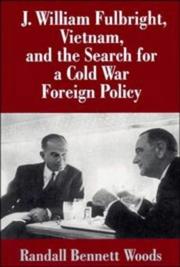
ISBN: 0521620597 0521588006 0511625960 Year: 1998 Publisher: Cambridge Cambridge University Press
Abstract | Keywords | Export | Availability | Bookmark
 Loading...
Loading...Choose an application
- Reference Manager
- EndNote
- RefWorks (Direct export to RefWorks)
J. William Fulbright was the longest serving and most powerful chair of the Senate Foreign Relations Committee. Both an intellectual and an internationalist, he had great influence over the course of American foreign relations in the 1960s and 1970s. Fulbright was also the most prominent, and the most effective, of the first American critics of the Vietnam War. His criticism was particularly galling and damning to Lyndon Johnson because Fulbright was a principled internationalist who could not be dismissed as an ideologue. Fulbright used hearings by the Foreign Relations Committee as a forum in which to advance his powerful critique of the war, and his writings constitute an ongoing, comprehensive critique of American foreign policy. This abridgement of Woods' prize-winning biography of J. William Fulbright presents the full story of Fulbright's role as one of the leading congressional opponents of the Vietnam War.
Fulbright, James William --- Arts and Humanities --- History --- Legislators --- Vietnam War, 1961-1975. --- Vietnam Conflict, 1961-1975 --- Vietnamese Conflict, 1961-1975 --- Vietnamese War, 1961-1975 --- Fulbright, J. William --- Fulbraĭt, Dzh. Uilʹi︠a︡m, --- Fulbright, James William, --- Fulbright, J. W. --- Fulbright, William, --- United States. --- Mei-kuo tsʻan i yüan --- United States --- Foreign relations
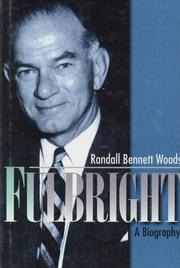
ISBN: 0521482623 Year: 1995 Publisher: Cambridge [England] New York, NY, USA Cambridge University Press
Abstract | Keywords | Export | Availability | Bookmark
 Loading...
Loading...Choose an application
- Reference Manager
- EndNote
- RefWorks (Direct export to RefWorks)
Book
ISBN: 9780465050963 Year: 2016 Publisher: New York Basic Books
Abstract | Keywords | Export | Availability | Bookmark
 Loading...
Loading...Choose an application
- Reference Manager
- EndNote
- RefWorks (Direct export to RefWorks)
Book
ISBN: 9780511625961 9780521620598 9780521588003 Year: 1998 Publisher: Cambridge Cambridge University Press
Abstract | Keywords | Export | Availability | Bookmark
 Loading...
Loading...Choose an application
- Reference Manager
- EndNote
- RefWorks (Direct export to RefWorks)
Book
ISBN: 0820312665 Year: 1991 Publisher: Athens, Ga University of Georgia Press
Abstract | Keywords | Export | Availability | Bookmark
 Loading...
Loading...Choose an application
- Reference Manager
- EndNote
- RefWorks (Direct export to RefWorks)
History of North America --- anno 1950-1959 --- United States --- United States of America
| Listing 1 - 10 of 11 | << page >> |
Sort by
|

 Search
Search Feedback
Feedback About UniCat
About UniCat  Help
Help News
News